

Updated June 26, 2025
People expect businesses to demonstrate corporate social responsibility (CSR) by taking stances on social issues such as the environment, politics, human rights, and gender. Some of these social issues, however, are less divisive than others and sometimes, silence is still the best public relations policy.
Updated April 11, 2022
Today, 71% of people think it’s important for businesses to support social movements and expect businesses to lean into controversy and take unwavering stances on issues related to the environment, human rights, gender, and politics.
Looking for a Digital Marketing agency?
Compare our list of top Digital Marketing companies near you
This leaves businesses wondering if they should speak up or stay silent on social issues in business and how their choices will impact their public relations strategy in the long run.
People expect businesses to approach social responsibility in a way that makes sense for their brand. Additionally, a business’s commitment to corporate social responsibility can influence people’s buying decisions.
Clutch surveyed 420 consumers in the U.S. to learn which issues they expect businesses to support and on which they prefer businesses to stay silent.
We found that people expect businesses to demonstrate corporate social responsibility by speaking up on social issues relating to:
In this report, businesses will learn which issues might be “safer” than others to their brand’s reputation and public relations and which are more divisive and best to avoid unless catering to a niche audience.
Need more help assessing your business’ reaction to a social issue? Reach out to an expert today!
How people expect businesses to show their commitment to corporate social responsibility has changed in the age of the socially connected and -conscious consumer.
Most people (71%) think it’s important for businesses to speak up about social movements, but for which businesses do they have the highest expectations?
Three-fourths of people think that large businesses (75%) and medium businesses (73%) should support social movements, compared to 59% who think small businesses should support social movements.
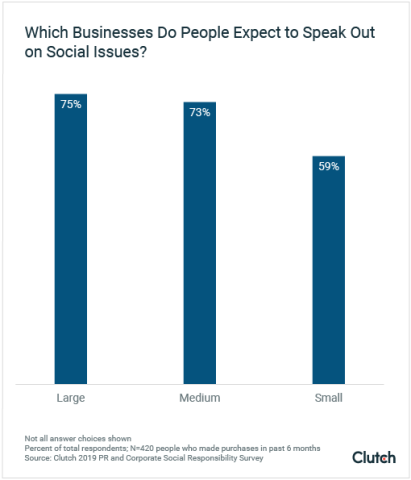
This gap in people’s expectations relates to the scope of a business's impact: People think larger companies have more power than smaller companies, and therefore, more responsibility.
“Global corporations should be held to a higher standard of responsibility because of their immense reach and power,” said Natalie Bidnick Andreas, a digital strategy consultant. “They create a livelihood for thousands of employees and their families; their ecological impact affects the world more; and, frankly, they turn the largest profit for their executives and shareholders.”
People hold larger companies to a higher standard of social responsibility because they have an impact on more people and the environment. Big brands are also highly visible which makes it easier for consumers to hold them accountable.
“Big companies have a whole lot more eyeballs,” said Craig Johnson, CEO of Matchstic, one of the top branding agencies in Atlanta. “If a company with 20 employees has an opinion on something, the local news isn’t going to show up, but when you’re a big company, the scale is so much bigger - you can change the global landscape of industry by making certain decisions.”
Large companies typically have the reach to achieve a greater impact, but they also run a higher risk of alienating employees, shareholders, and customers who disagree with their stance.
Although most people expect large and medium businesses to take stances on social issues, more than half of people also expect small businesses to do their part.
Businesses must face social issues because:
Businesses need to be cautious about how speaking up on social issues can alienate consumers.
Most people say businesses should support movements related to the environment (89%), human rights (80%), gender (74%), and to a lesser extent, politics (56%).
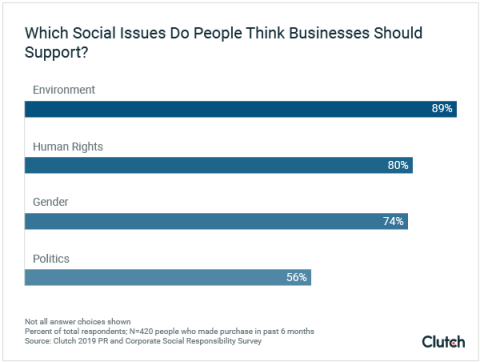
Environmental and human rights issues are universal concerns, so people expect businesses to support them.
“The environment and human rights are universal,” said Patrick McCaully, CEO of Pointman News Creation, a public relations agency. “These will always be issues that resonate with people.”
Businesses that speak out on human rights or environmental issues are least likely to cause controversy, but these issues still tend to be politicized in society, making controversy difficult to avoid.
Some brands determine that the benefits of taking a stance on social issues outweigh the risks, especially if the issue aligns with their identity and values.
“You don’t make the decision to jump into a social movement because it's trendy or to generate buzz,” said Scott Hancock, CEO of BLVR, a branding agency. “You do it because it is a belief that runs through the soul of your brand.”
Companies should consider their branding and public relations strategies before taking a stance on a social issue. It’s important to make sure the issue in question aligns with their brand identity and long-term public relations goals.
For example, Ben & Jerry’s has long positioned its brand at the forefront of environmental- and social justice-related causes, including climate change. Ben & Jerry’s clearly expresses its support for the environment and human rights on its website and encourages its customers to be socially conscious.
Ben & Jerry’s clearly expresses its support for the environment and human rights on its website and encourages its customers to be socially conscious.
It also fosters a community of activism around its brand.

Ben & Jerry's unwavering commitment to the environment and issues related to human rights, inequality, and social justice has resulted in a loyal customer base but has also opened the brand to criticism.
By positioning its brand in front of controversial environmental and human rights issues and directly criticizing President Trump's policies in 2018, Ben & Jerry’s often got a combination of positive and critical comments on its content.

Some social media users applaud Ben & Jerry's stance on human rights and equality, while other users are more critical.
“Are snowflakes the main ingredient?” commented Instagram user @jackalholdings. “I’m going to resist buying your ice cream. Never again.”
Comments like these highlight the politically charged language around social issues that have become associated with specific political ideologies.
While 89% of people support businesses that take stances on the environment, only 56% of people support businesses that take political stances.
The line between what is and is not political, however, is becoming increasingly difficult to discern as topics such as the environment, human rights, and gender become more politicized.
Social issues related to gender are generally the most divisive social issues for a business to support.
People are more likely to stop shopping with a company that supports movements related to politics (15%) and gender (10%) compared to human rights (5%) and the environment (2%).
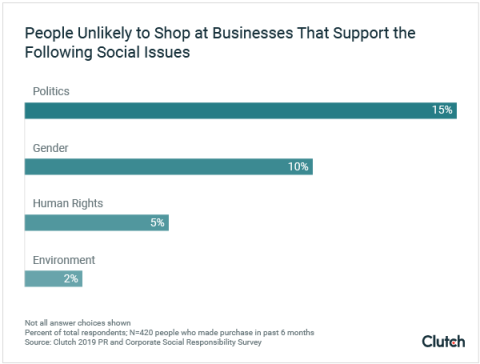
People are more likely to boycott a company that takes a stance related to politics or gender than the environment or human rights which is a symptom of the deep ideological chasms running through communities in the US.
“Currently in the US, politics are extremely divisive,” McCaully said. “The divisiveness in these findings is pretty consistent with the divisiveness in the nation over politics.”
Since social issues in business tend to be politicized, companies should be prepared for backlash when they express support for an issue.
For example, Gillette’s 2019 “The Best a Man Can Be” commercial addressed the “boys will be boys” mentality that many have cited as problematic in the eruption of the #MeToo movement.

Gillette received visceral reactions of both praise and criticism when the ad was released.
“It seems that people don’t appreciate moral education from their razors,” said Nate Masterson, CEO of Maple Holistics, a company that produces natural cosmetic products. “The truth is that nobody likes to be called out for their faults, or assumed faults, and told to change.”
The commercial challenged its targeted audience to be introspective and hold other men accountable for how they treat each other and women, which resulted in many people declaring it as “anti-male.”
It was also accompanied by a social media campaign and an announcement that Gillette will donate money to nonprofit organizations “helping boys and men achieve their best.”

After the commercial’s release, people called for the company’s leadership to issue an apology; however, Gillette stood unwavering in its stance.
Businesses that speak out on social issues related to gender are likely to face opposition as gender becomes more politicized.
Companies that choose to take a stance on a divisive issue should consider the impact it will have on their brand and make sure it’s something the brand is willing to stand behind.
Sometimes, silence is still the best policy for businesses.
While some topics such as those relating to the environment and human rights might be “safer” for businesses to support, it doesn’t mean businesses should speak out on these social movements.
Nearly two-thirds of people (63%) say they are likely to continue shopping at businesses that stay silent on issues they care about. 
Slightly fewer people (58%) say they would continue shopping at businesses that take stances on issues they disagree with.
Companies that speak up on social issues in business and those that choose to stay silent risk losing customers, but staying silent may have less severe consequences.
For some companies, it may be worth the risk to associate their brand with an issue they genuinely believe in and that fits naturally with their brand identity.
“Many firms are willing to sacrifice profits, and some may actually find it profitable to differentiate their products, establishing themselves as a brand that takes on a particular set of social stances,” said Dr. Daniel Hall, chair and associate professor of economics at High Point University.
If a social issue isn’t relevant to its brand identity or if a business is not prepared to stand behind its stance in the face of backlash, experts say remaining neutral may be the best course of action.
“If you’re a mattress company, do you need to take a stance on these issues?” McCaully said. “Probably not because you’re seen as a fairly genderless and unambiguous product that is in every house.”
Companies deciding whether to support social issues should consider if the social issue aligns with their brand identity.
For example, Matthew Ross, co-owner and chief operating officer of The Slumber Yard, a mattress review site, chooses not to position his brand in favor of or against controversial social issues.
“You could say my business partner and I are more focused on making money than speaking out on issues we believe in,” Ross said. “We save those kinds of conversations for the dinner table.”
Ross and his business partner leave controversial topics out of their brand’s discourse since, as a mattress review site, it doesn’t make sense for their brand to take stances on divisive issues.
If a business decides to take a stance on a social issue or movement, it will need to consider how it will inform the public.
Most people think businesses should voice their support for social issues through donations (56%), social media (52%), sponsorships/endorsements (50%), and events (50%).
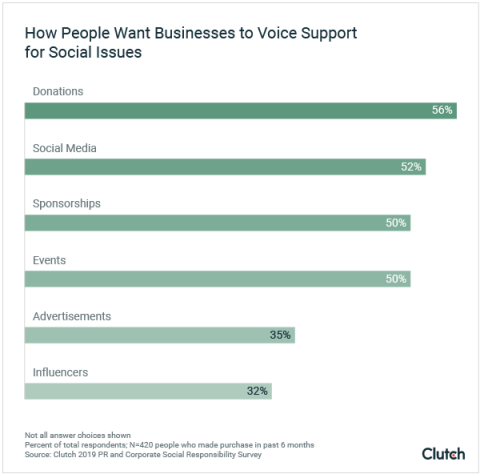
How Businesses Can Support Social Issues:
Social media presents the most opportunity for businesses to spread their message and encourage engagement. This also means businesses open themselves to criticism and risk losing control of their message.
“If you’re committing to having an open social media platform where you’re talking about the position of your company, then you’re opening yourself to potential criticism from people who are on the other side of the issue,” McCaully said. “The most important public relations component of that is to have a crisis management plan in place and clearly identifying what happens if people react negatively.”
McCaully recommends businesses anticipate possible reactions to their stances on a social issue by asking:
Businesses that take a stance on social media should have a crisis management strategy in place should the campaign backfire.
For example, Starbucks has started multiple social media campaigns to address social issues with mixed results.
In 2015, they launched their #RaceTogether campaign to address racial tension and injustice in the United States.
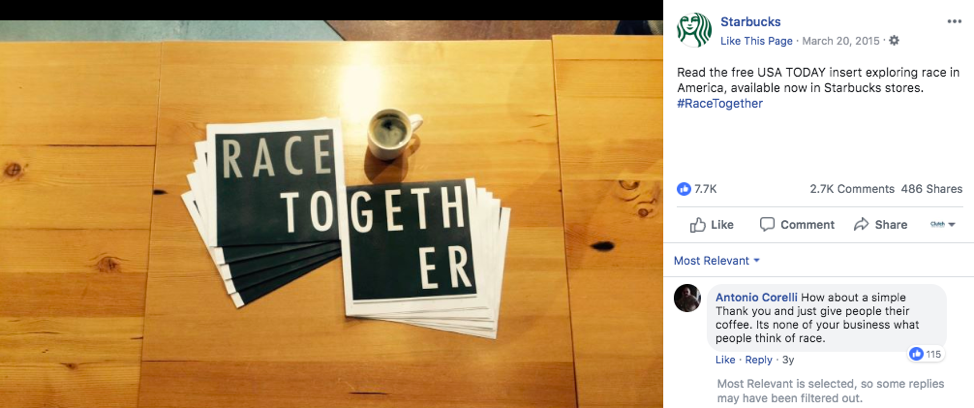
The campaign ultimately failed, and Starbucks lost control of the messaging as some people saw the effort as insensitive, tone-deaf, and hypocritical.
Since then, Starbucks has mostly recovered but still receives criticism when it takes a political stance.
“Once you take a strong position through public relations or social media, it had better be what you believe, can back up, and feel good about as a company because you’re going to open yourself up to criticism," McCaully said.
Businesses that choose to take stances on social issues through social media should be prepared to handle backlash by updating their crisis management strategies. Consulting a PR agency can also help make sure a company’s message is clear and will resonate with the target audience.
Although businesses may receive pressure from consumers to respond to social issues and movements, they should never take a stance impulsively.
Businesses that share values with their customers may find it beneficial to support social issues they genuinely care about, while businesses with brands that are not driven by social issues might want to consider silence on topics that could divide their consumer base.
The definition of corporate social responsibility has expanded to include businesses using their power to voice support or dissidence for specific social movements. While this may be a good choice for some brands, it is not always the responsible choice for others.
Interested in learning more about corporate social responsibility? Reach out to an industry professional today!
Additional Reading:
Clutch surveyed 420 people in the U.S. who have made a purchase either in-store or online within the last six months.
Most survey respondents are male (57%), and 43% are female.
Thirty-five percent (35%) are millennials (ages 18-34); 48% are Generation Xers (ages 25-54), and 16% are baby boomers (ages 55+).
Thirty-seven percent (37%) are conservative; 34% are liberal, and 29% are moderate.


